Lessons in Manliness from Harry Houdini
Lessons in Manliness from Harry Houdini
Harry Houdini. “The Handcuff King.” “The Man Who Walked Through Walls.” Master Magician. Escape Artist Extraordinaire.
Almost a century has passed since his death and Houdini, who was the most famous entertainer of his time, is still a name nearly everyone knows and reveres. He was king of the “Golden Age of Magic.”
His enormous popularity can be traced to the human desire to defy death. Houdini seemingly flirted with death again and again, only to laugh in its face and emerge in the land of the living. It didn’t matter how many chains you bound him with, how strong the handcuffs, how tight the ropes; it didn’t matter whether you placed him in a crate or a vault or a safe or a prison; he would always find a way out. Nothing could hold him; he seemed truly invincible. He refused to be bound not only by ropes and chains, but also by the constricting assumptions of what is possible for an “ordinary” man to do. He has rightly been called America’s first “superhero.” And therein lies the heart of his appeal; he seemed in every way superhuman, but he was still one of us. He showed the enormous potential of man when he knows how to hustle and push the boundaries of his capabilities.
Houdini’s life and deeds could potentially provide enough fodder for a dozen posts; today we present just a few of his lessons in manliness.
Deliberate Practice Is the Key to Greatness
Throughout his entire career, fans speculated as to how Houdini accomplished his amazing feats. There was a camp that believed he was in touch with the spirit world and that supernatural powers allowed him to dematerialize to effect his escapes.
But the secret to Houdini’s success was not mystical, or even magical. It was his determination to pour every ounce of blood, sweat and tears into being the very best in the world. In short, he was a master of deliberate practice.
When Harry first started practicing magic as a young man, he would have his brother tie him up in ropes and would then spend hours on the roof of his family’s tenement apartment attempting to free himself. He took up running and biking long distances to build his body and endurance. Having learned to converse on the streets of New York City, he worked to drop the “youse” and “aints” that revealed his lack of formal education. He took classes on speech and debate to hone his skills as a charismatic showman.
By age 18 he had trained himself to hold his breath for 3 minutes and 45 seconds.
He set out to learn the secrets of every lock in the world, unable to rest until he knew how to pick them all with ease. He collected every kind of handcuff he could find and pored over drawings of every lock made in the US and Europe, studying them until had he acquired an encyclopedic knowledge of every key and lock in the world.
“vigorous self-training, to enable me to do remarkable things with my body, to make not one muscle or a group of muscles, but every muscle, a responsive worker, quick and sure…” -Houdini on one of the secrets to his success
In his home, he built a large sunken tub in which to practice holding his breath and escaping underwater. To train himself for stunts in which he would jump into frigid rivers while handcuffed and shackled, he would add ice to the water to build up his stamina. He actually learned to like these freezing dips, to the point he could say, “I only feel good after one of these baths.”
He practiced using his toes to untie knots until they had the dexterity of the average man’s fingers. He practiced swallowing objects and bringing them back up again. He practiced sleight of hand and misdirection in front of a large mirror.
He rarely slept more than 4 hours a night and kept a notebook by his bedside in case he awoke with an idea.
His practice sessions were so constant, so all-consuming that he would frequently forget to eat and bathe; his wife Bess had to remind him to change his underwear.
He built himself into the man he wanted to become, element by element.
Conquer Fear and Pain
While Houdini may have made his escapes look so easy that people thought spirits were aiding him, the truth was that his exploits were often grueling, highly physical endeavors. The stunts were designed with safeguards and had “tricks” as to how they were done, but they still involved a great deal of strength, flexibility and steely courage.
Houdini said that without the ability to conquer his fears, the result would not only be public embarrassment, but potential death:
“When I am stripped and manacled, nailed securely within a weighted packing case and thrown into the sea, or when I am buried alive under six feet of earth, it is necessary to preserve absolute serenity of spirit….If I grow panicky I am lost.”
Crate containing Harry Houdini lowered into New York Harbor, July 7, 1912.
Success also required the ability to endure pain. Houdini would accept nearly any challenge thrown at him. Audience members would bring all manner of handcuffs, locks and chains to his shows and groups would come up with bizarre tests of his prowess, like asking to chain him to a lit cannon. Every performance was his Waterloo; Houdini knew that if he failed a challenge, his reputation, his aura of invincibility would be ruined. He had to escape–no matter the cost to his body. Thus, while many escapes would only take a minute or two, others could require an hour and truly test his endurance and mind; he would emerge sweating and gasping for breath, his clothing torn and eyes bloodshot. Ropes would be tied so tight they would cut off his circulation, cruel shackles would leave his ankles and wrists bruised and cuffs and locks would pinch his skin; freeing himself from them necessitated the tearing of his flesh. But for Houdini, the show would always go on.
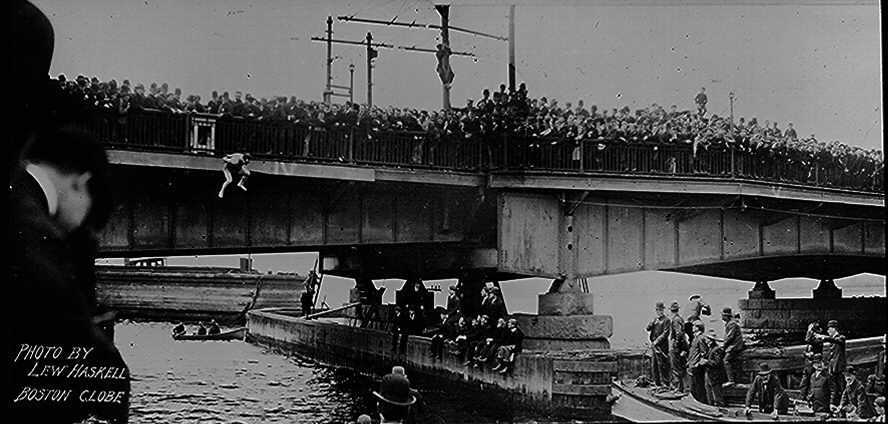
“While the manacles and shackles are being adjusted so that my limbs are powerless to move, I look down at the water flowing so far below; then I make up my mind I am going to do it. From the time I let go till the moment I strike the water everything is blank and my ears are filled with strange songs. If the season be winter with the temperature of the water in the vicinity of freezing, the ordeal is one to be dreaded. The bitter cold of the first plunge seems to cut right into my heart and I very often bite my lips almost through, so great is the shock.”
Jumping 31 feet into the Woolloomooloo Bay, Houdini hit face-first; the impact caused two black eyes and loosened several teeth. On another occasion, he let young men tie him up and cover him with tar. He freed himself in 41 minutes, but it “Hurt like hell.”
When his ankle snapped while being lifted into the water torture cell, the doctor urged him to seek immediate medical attention and go to the hospital. But Houdini went through with the trick and finished the whole show. He made himself a splint for the fractured ankle and a leg brace and continued on the tour.
On another occasion, a blood vessel in his kidney burst while he was being sealed tightly in a canvas bag by a “gang of longshoremen.” He started urinating blood and the doctor told him to take it easy for several months and to lay off the strenuous escapes. Houdini informed the doctor that such a respite was impossible. “It is my duty to inform you that by continuing your present regimen you would be committing suicide. You must reconcile yourself to the fact that your strenuous days are over…If you continue at present, you will be dead within the year,” the doctor gravely intoned. “You don’t know me,” Houdini replied with a shrug. He took two weeks off and then went back at it with his usual aplomb. For the next 15 years, the magician sent the doctor photos and news clippings of his dangerous exploits along with a note: “Still alive and going strong.”
Of course this stoicism in the face of pain could be take to an unhealthy extreme and would be his undoing. After weathering several punches to the abdomen by a man who wanted to test the legendary steeliness of the magician’s stomach, Houdini was left in severe pain. Although he was running a temperature of 104, he felt obligated to his audience to continue his performances. When he finally consented to be taken to the hospital days later, his appendix had already burst and despite surgery, Houdini failed his final escape…from death.
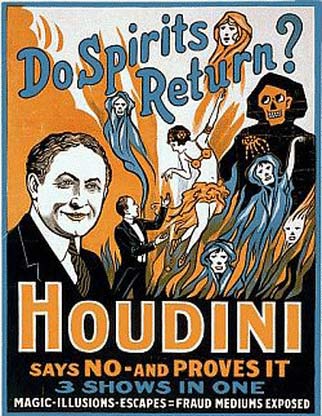 Spiritualism was all the rage after WWI, as many families longed to make contact with their loved ones who had been killed. Houdini always insisted that he kept an open mind and desperately wished that mediums really could make contact with dead spirits, but he could not find any mediums who were not fraudulent.
Spiritualism was all the rage after WWI, as many families longed to make contact with their loved ones who had been killed. Houdini always insisted that he kept an open mind and desperately wished that mediums really could make contact with dead spirits, but he could not find any mediums who were not fraudulent.
An avowed enemy of humbuggery, Houdini devoted the latter part of his life to exposing false mediums and the tricks they used.
He promised to try to make contact once he himself had crossed over, but so far, he has not pierced the veil with a message.
Keep Pushing Your Limits
Houdini became a national star at age 26 and several years later had conquered Europe as well. He escaped from jails cells around the US, federal prisons, Scotland Yard and the dreaded Siberian wagon transport, essentially a safe on wheels.
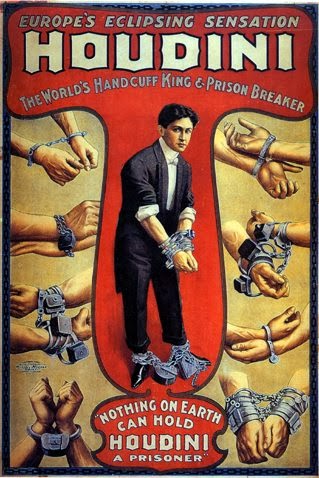
Having freed himself from every mechanism thrown his way, he was known around the world as the undisputed “Handcuff King.”
But Houdini was never content to rest on his laurels. He couldn’t; imitators were constantly stealing his act, duplicating his feats and falsely accusing him of being a fraud. So he would ever push his limits, forever looking to evince a stunt so incredible it couldn’t be duplicated.
When audiences became inured to his simple handcuff escapes he upped their difficulty—jumping from bridges into rivers while shackled, chained and weighed down and emerging from coffins, chests and packing boxes which had been nailed shut and even built right on the stage. He would complete such escapes in minutes, leaving the chains and handcuffs still locked and the containers seemingly untouched.
He found his way out of a variety of interesting objects as well—a glass box, a canvas and leather mail sack, a giant football sown shut, a roll-top desk, an iron boiler and even the belly of a “sea monster,” a strange creature that had washed up on shore and couldn’t be identified.
Houdini would escape from a straight jacket while hanging as much as 400 feet off the ground.
To remove the jacket, he had to dislocate one of his shoulders.
When rivals copied some of these tricks, he introduced elements of greater danger. For example he combined his box escapes and his river jumps. He climbed into a heavy pine box so small he had to bring his knees into his chest to fit. He was then handcuffed and shackled and the box was nailed shut, wrapped in ropes and chains, weighted with 200 lbs of metal and tossed into New York City’s East Harbor. Houdini escaped in less than a minute-with the box intact and the ropes and chains still in place.
He then brought the specter of a drowning death to the indoor stage, first with the milk can escape and then with the water torture cell.
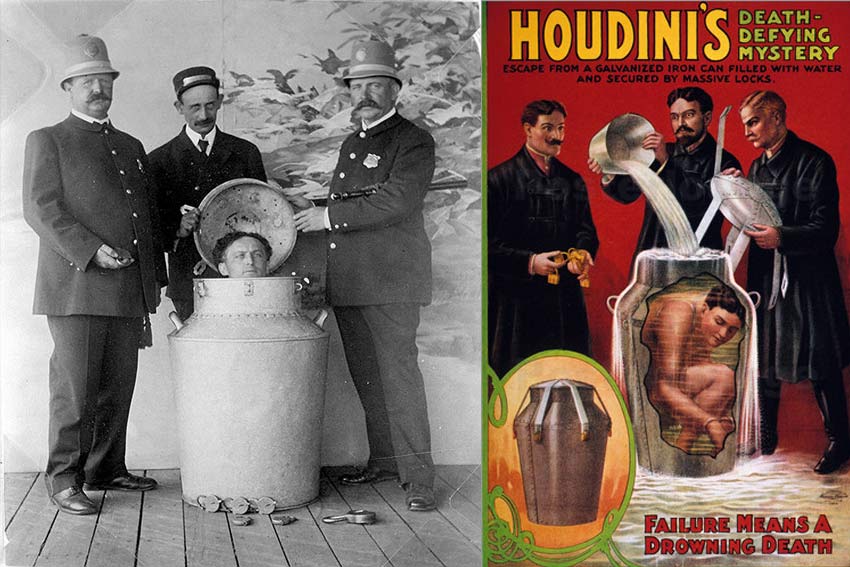
To build suspense for his milk can trick, Houdini would have the audience hold their breath for as long as they could. After a minute or so, all would have given up. He would then climb into the can, which was filled with buckets of water, the lid was locked on top with 6 padlocks, a cabinet was drawn around the can and a giant timer began ticking down the seconds. Houdini’s assistant would pace nervously with an axe, waiting to smash open the can if Houdini did not emerge. Around the 3 minute mark, with the audience nearly overcome with anxiety, Houdini would step dripping wet from the cabinet to thundering applause.
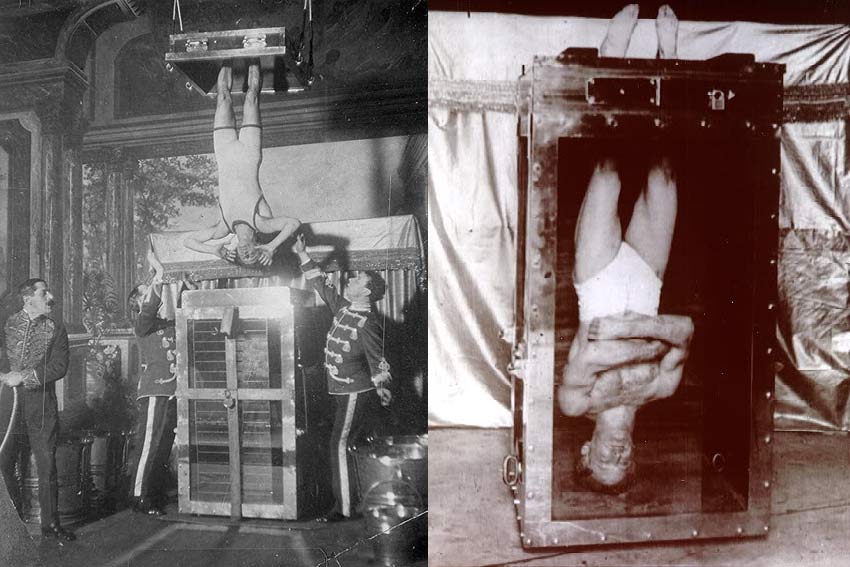
In the water torture cell trick, Houdini’s feet were locked into the stock and he was lowered upside down into a water filled tank, which was then padlocked shut. He emerged in 2 minutes, the tank still filled with water and the top still locked in place.
“The water torture cell was constructed by myself…It took two full years. Another year was required to give me sufficient courage to attempt same. And can you blame me? Imagine yourself jammed head foremost in a cell filled with water, with your hands and feet unable to move and your shoulders tightly lodged in this imprisonment…I believe it is the climax of all my studies and labors. Never will I be able to construct anything that will be more dangerous or difficult for me to do. Having flown a biplane and taught myself to become an expert aviator, I am in a position to state that flying is child’s play in comparison.”
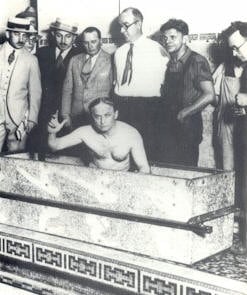 Houdini didn’t slow down as he got older. At age 52, he had himself sealed in an airtight coffin which was then submerged underwater.
Houdini didn’t slow down as he got older. At age 52, he had himself sealed in an airtight coffin which was then submerged underwater.
He rested there for an hour and a half in 100 degree temperature. All to debunk a rival who performed a “buried alive” trick under the claim that a man could only survive in such a state for 3 minutes and that it was necessary to enter into a mysterious cataleptic state in order to last longer.
It was just a matter of endurance and training, Houdini showed. Houdini also had himself buried under 6 feet of dirt and clawed his way out.
This was no trick: Houdini had a keen interest in flying and became one of the world’s first pilots, even setting a flight record in Australia.
Practice, courage, discipline, strength, the hunger for greatness– these were the keys to Houdini’s success. It came down to will, as it does for all of us. How badly do you to become the man you want to be? Are you willing to pay the price?
“I want to be first. I vehemently want to be first. First in my profession…For that I give all the thought, all the power, that is in me. To stand at the head of my rank: it is all I ask…so I have struggled and fought. I have done and abstained; I have tortured my body and risked my life, only for that–to have one plank on the stage where they must fall back and cry ‘Master!’….I am strong, as you see; strong in flesh, but my will has been stronger than my flesh. I have struggled with iron and steel, with locks and chains; I have burned, drowned and frozen till my body has become almost insensible to pain; I have done things which rightly I could not do, because I said to myself, ‘You must;’ and now I am old at 36. A man is only a man and the flesh revenges itself. Yet the will is its master when the will is strong enough. Do you think that these religious martyrs-the willing martyrs-those in India, say-who torture themselves by driving hooks through their flesh and swinging suspended-do you think they suffer pain? I say ‘No; they do not.’ I have proved it in myself. To think vehemently of a thing, of the feat, that conquers the pain-some kinds of pain. If the thought is intense enough, the pain goes-for a time. Sometimes the task before me is very hard. Not every night, but sometimes. I must fling myself down and writhe; I must strive with every piece of force I possess; I bruise and batter myself against the floor, the walls; I strain and sob and exhaust myself and begin again and exhaust myself again; but do I feel pain? Never. How can I feel pain? There is no place for it. All my mind is filled with a single thought-to get free! Get free! And the intoxication of that freedom, that success is sublime.” -Harry Houdini
Sources and Further Reading
The Secret Life of Houdini by William Kalush and Larry Sloman
Houdini: Master of Illusion by Clinton Cox
In addition to being a magician, escape artist, pilot, actor and spiritualism debunker, Houdini also penned many books and magazine and journal articles (and this was really the role he was most proud of). He wrote about magic of course, but also on revealing the tricks of criminals and debunking false mediums and superstition generally. His books are available free online from the Library of Congress and Google books.
Editor-in-Chief’s Note: This post was written by Brett and Kate McKay of The Art of Manliness. The Art of Manliness is a fantastic Website dedicated to uncovering the lost art of being a man. It features articles on helping men be better husbands, better fathers and better men. Check them out and be sure to subscribe!






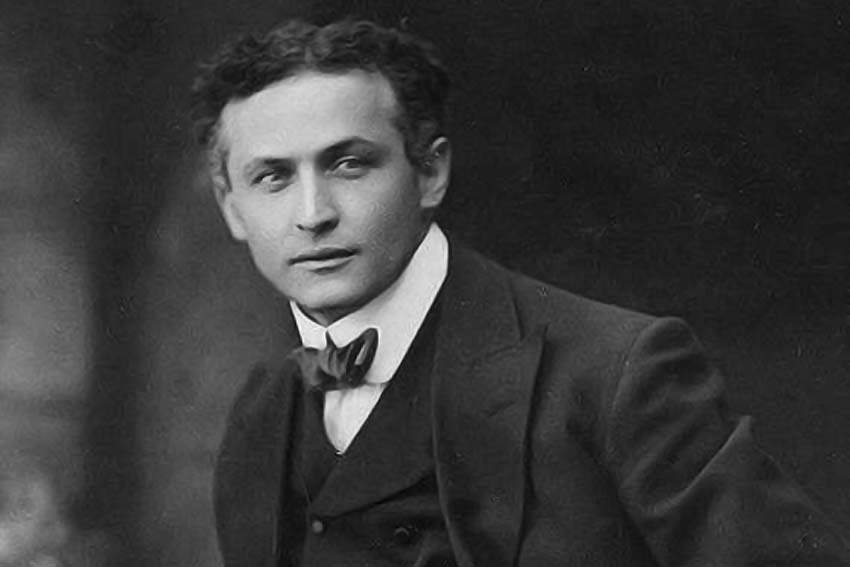
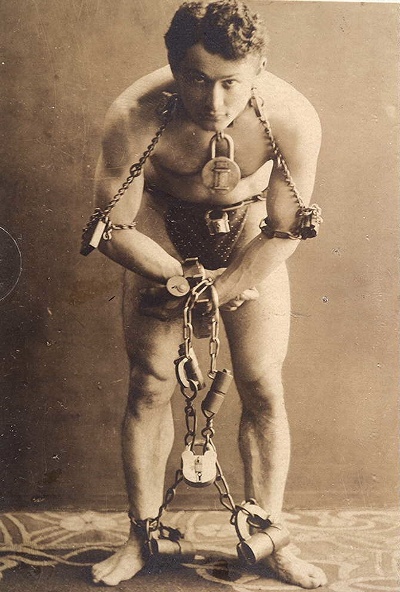
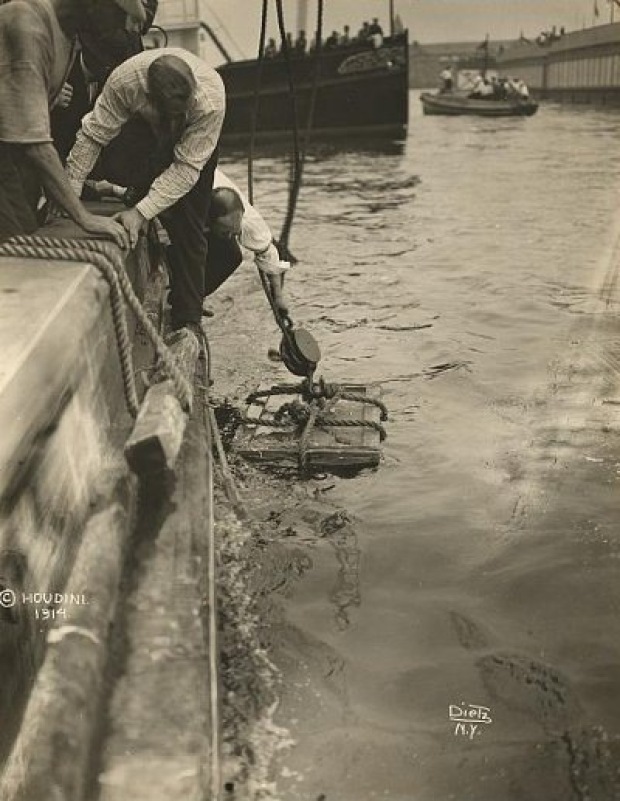
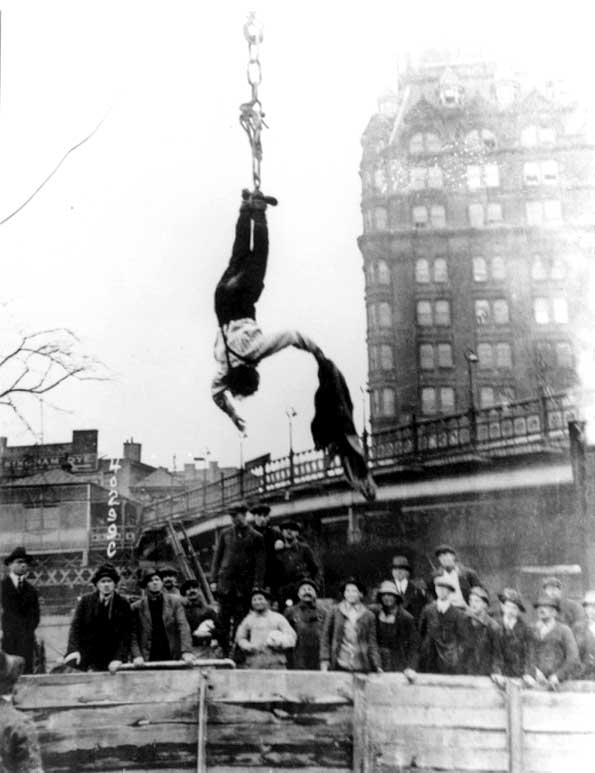
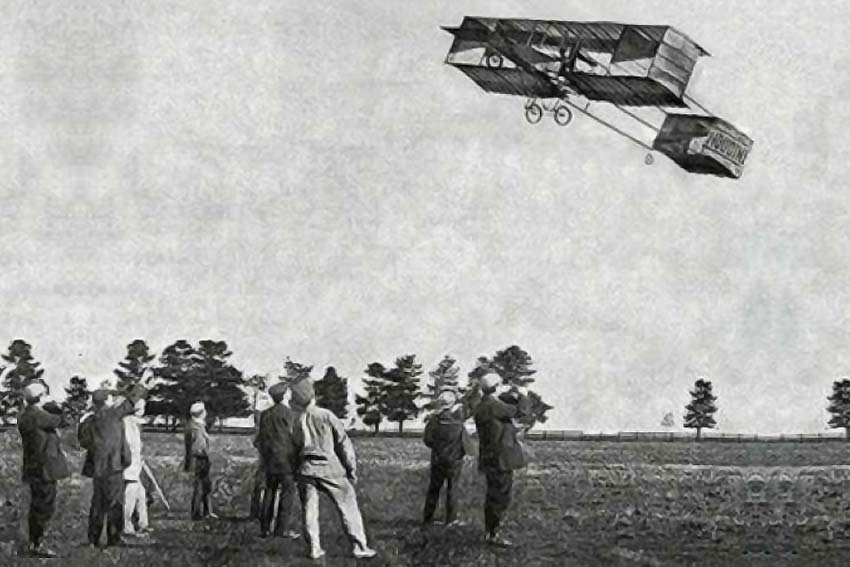
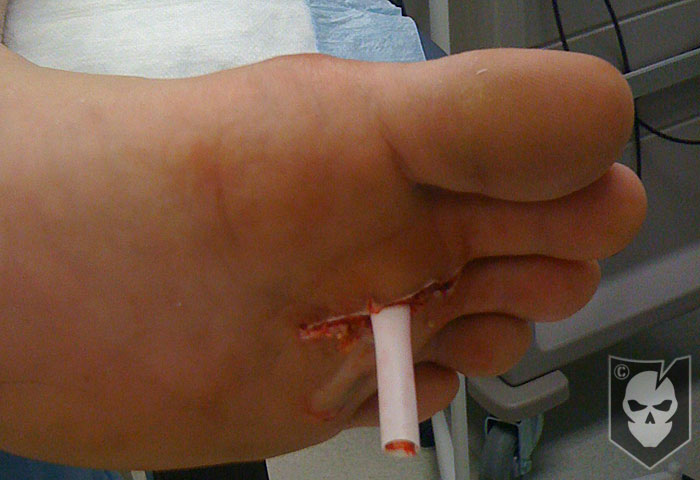
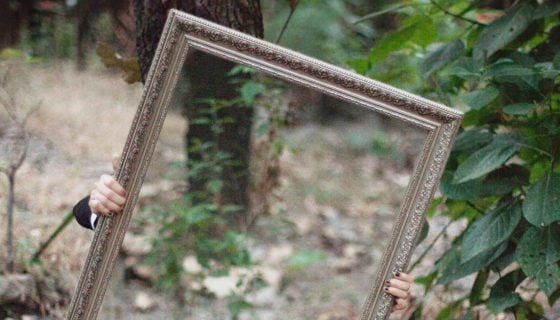
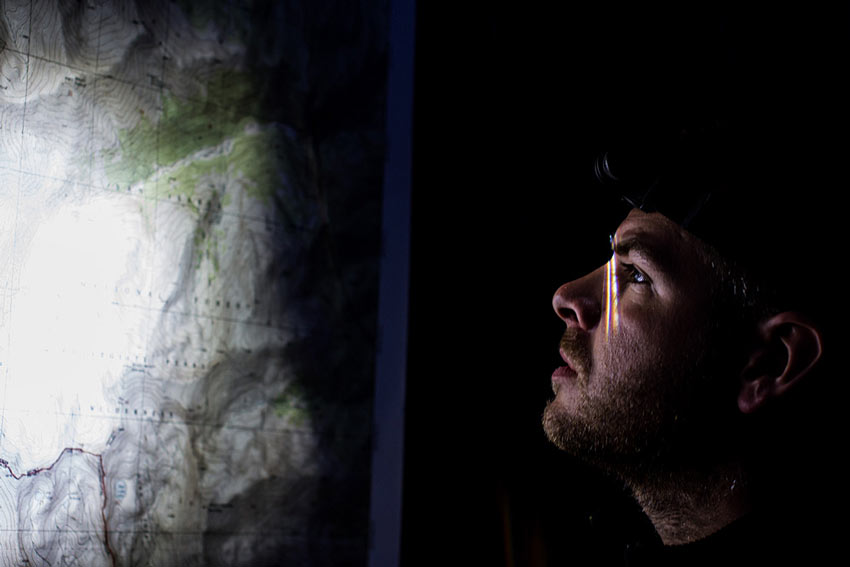

Discussion